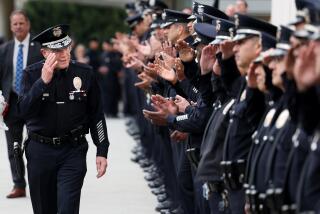Budget Woes Block Last of LAPD Reforms, Chief Says
The Los Angeles Police Department has carried out most of the reforms proposed by the Christopher Commission, but budget constraints have blocked complete implementation of several key recommendations, Chief Willie L. Williams told the Police Commission on Tuesday.
Williams expressed satisfaction that the department already has incorporated most of the Christopher Commission’s recommendations on a host of sensitive issues, including those involving the use of force, internal oversight and eliminating discrimination.
However, Williams and the police commissioners voiced frustration that funding shortages have doomed, or at least delayed, other reforms central to improving the often uncomfortable relations between police and some of the city’s residents. Among the deferred reforms are those bolstering internal investigations, officer training and the public complaint process.
Even though commanders are still revamping procedures, police officials indicated that the lack of funds is a stumbling block that looms ever larger in the embattled department’s future.
“Some serious decisions are going to have to be made, whether or not we’re going to put this on the shelf pending financing,” the chief said as he provided the latest in a series of status reports on the recommendations.
The panel--chaired by Warren Christopher, now U.S. secretary of state--was assembled after the Rodney G. King beating in an effort to identify and resolve problems within the 7,600-officer Police Department.
Commander C. F. (Rick) Dinse, who heads the department’s Human Resources Bureau, stressed that a lack of money is the big problem.
For example, the chief, in seeking to implement key recommendations of the Christopher panel, has proposed doubling the number of internal affairs investigators, who examine allegations of police wrongdoing.
However, the Police Commission has concluded that fiscal realities render the expansion plan--which would probably cost more than $2 million--”virtually unobtainable in the short term.”
Budget restraints have also stalled plans to improve and modernize training by decentralizing the process and assigning a full-time training coordinator to each division. A Police Commission report has called such a program essential to community-based policing. Police commanders noted that forms to be used by civilians complaining of police abuse still have not been translated into several languages, particularly Asian languages. The forms are available in English and Spanish.
Certain other pending reform recommendations must still be worked out between department management and the Police Protective League, which represents rank-and-file officers.
Despite all that remains to be done, commissioners offered little hope Tuesday that funds would be forthcoming to implement stalled proposals.
“Unfortunately, the city’s financial condition has precluded responding with any resources,” said Ann Reiss Lane, a police commissioner.
Nonetheless, commission President Jesse A. Brewer praised the department for making “great progress” in carrying out most of the 130 reforms called for by the Christopher panel.
More to Read
Sign up for Essential California
The most important California stories and recommendations in your inbox every morning.
You may occasionally receive promotional content from the Los Angeles Times.









